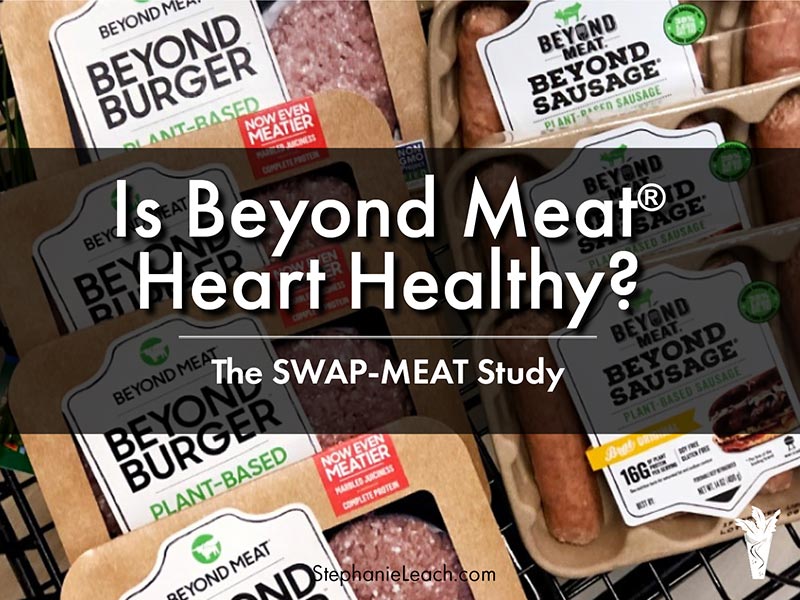There are a growing number of meat substitutes available today in grocery stores and on restaurant menus. These include Beyond Meat®, Impossible Foods™, and other store brand versions of plant-based ground beef, hamburgers and sausage.
But are they heart healthy?
After all, these meat substitutes are highly processed (plant-based, but NOT whole food as they contain isolates and extracts) and they contain a lot of coconut oil, which is high in saturated fat.
So many would understandable say, “NO, avoid at all costs,” assuming these are unhealthy food choices with negative health consequences.
But what if a person is still eating red meat? Would their health improve if they switched to some of these products? Or would it remain the same? (Or maybe even worsen?)
Well, now we finally know, because researchers at Stanford Medicine did a study on it, and the results were published August 11, 2020 in the American Journal of Clinical Nutrition.
You may be surprised at what the researchers found. They sure were.
The SWAP-MEAT Study
In this crossover study, 36 people were randomized into 2 groups. One group ate two servings of red meat a day for 8 weeks, and the other group consumed 2 servings of Beyond Meat products for 8 weeks. Then each group switched to the other diet.
Researchers wanted to know how each diet affected cardiovascular risk, so they measured things like cholesterol, blood pressure and weight.
They also measured an emerging risk factor for heart disease, TMAO.
What is TMAO?
TMAO stands for trimethylamine N-oxide, which is produced when your body digests food that contains choline, found in red meat, eggs, fish and poultry.
Certain bacteria in your gut feed on the choline, which then produces trimethylamine (TMA). Your liver converts TMA to TMAO. The more meat, dairy and eggs you eat, the more meat-eating bacteria grow in your gut, and the more TMAO your body produces.
Here’s why it matters.
“According to a news article published June 11 [2019] in JAMA, three recent analyses have linked high blood levels of TMAO with a higher risk for both cardiovascular disease and early death from any cause. In one of those studies, researchers found that people with higher levels of TMAO in their blood may have more than twice the risk of heart attack, stroke, or other serious cardiovascular problems, compared with people who have lower levels. Other studies have found links between high TMAO levels and heart failure and chronic kidney disease.” – Harvard Health
That is certainly concerning. Higher TMAO may double your risk of heart attack, stroke or other serious cardiovascular problems.
Study Results
So, how did the study turn out?
The participants that ate the red meat diet first had an increase in TMAO, while those that started with the Beyond Meat instead of their normal diet of 1-2 servings a day of meat saw a drop in TMAO.
Interestingly, those that ate the plant-based “meat” first for 8 weeks, then switched to red meat, did NOT experience an increase in TMAO. What happened?
Because they stopped feeding their meat-eating gut bacteria, this species of bacteria was nearly wiped out. When they returned to eating red meat, there were no large colonies of TMA producing gut bacteria around. (But eventually, if they continue to eat meat, those gut bacteria would flourish, and the TMAO engine would be running again.)
In both groups, the study participants’ LDL cholesterol dropped an average of 10 miligrams per deciliter at the end of the plant-based phase, which is statistically and clinically significant. (They also lost an average of 2 pounds during the plant-based portion of the diet. Modest, but welcome.)
Would they have seen an even greater improvement had they eaten whole food alternatives rather than coconut oil laden meat alternatives? Undoubtedly, as coconut oil has been proven to increase cholesterol levels, and they were likely still eating eggs and dairy.
But in this case, they weren’t consuming dietary cholesterol from meat, and there may have been some cholesterol lowering effects from the plant-based protein, so they experienced a clinically significant drop in LDL cholesterol levels. (Although not as much as is possible with a WFPB diet, where individuals can see a drop of 20-50% in their cholesterol levels in just 10 days.)
The Take-Away
As a Certified Health Coach, I advocate for a whole food, plant-based diet – as much as possible.
Joel Fuhrman, MD advises that 90% of our diet be based on whole and minimally processed plant-foods. This allows for 10% of our calories to come from less than ideal sources – which makes eating out or accepting a dinner invitation at a friend’s house so much more doable. That 10% of our calories can include low-nutrient foods, including highly-processed meat alternatives.
- NOTE: These products are high-calorie, so it doesn’t take much to exceed that 10% of overall calories!
Here are some other reasons to be happy these products are on store shelves.
More meat-eaters are exploring plant-based options. Plant-based meats are cholesterol-free, cruelty free and much better for the environment. And they can be a bridge to eating more whole food, plant-based proteins. (Rome wasn’t built in a day! Change can take time, and any step toward less meat should be applauded.)
If you prepare meals for a family that wants something that looks and tastes similar to meat on their plate, these products help you satisfy your family while keeping meat out of the house. I regularly buy Beyond Meat Brats and Breakfast Sausage for my husband who is a die-hard sausage lover. He appreciates my efforts to accommodate his food preferences, and I appreciate his efforts to eat the plant-based meals I prepare. It’s a win-win!
If you are already eating a WFPB diet, and have eliminated most of the oil, you probably won’t like most of these high-fat meat alternatives. These foods leave a noticeable oil-slick on your tongue. (If you eat meat, you won’t notice.) When I cook these products, I cook them much longer than suggested to render out as much of the coconut oil as possible, and mop it up with paper towels.
But if you are new to eating plant-based, and are looking for a way to reduce your meat consumption (or your family’s meat consumption,) it’s nice to know that these meat alternatives have no adverse health effects and actually confer health benefits – lower cholesterol and lower TMAO – for better heart health.
What’s your opinion? Share it with me in the comments below.









Leave A Comment